- Home
- Fay Weldon
The New Countess Page 4
The New Countess Read online
Page 4
‘Oh Redbreast! And very happily married, to all accounts, and what’s more a mother of two,’ said Diana – quite sharply, Minnie thought – ‘so leave her alone and bloody well behave.’
Then Diana turned to Minnie and said, ‘Redbreast and your husband had quite a falling-out, Minnie, once upon a time, over some girl. That was long ago, when Arthur was a single man, of course. But it’s all forgiven and forgotten now, isn’t it, Anthony.’
So Diana did remember. But remembering hadn’t stopped her knocking on the Thunderer’s window: if Diana was not embarrassed to renew the acquaintance, why should she, Minnie, be?
‘Any difference I may have had with the young Viscount is long over and forgotten,’ said Anthony. He had a drawling voice, which seemed to savour words. ‘He was my fag at Eton. One must be slow to wrath, they taught us, so one does one’s best.’ He looked into Minnie’s eyes with his dark-lashed ones and held them until she was the one to look away: he took her gloved hand in his.
‘And of course one is a writer. One understands the frailties of the human disposition.’ So Stanton Turlock had looked into her eyes, while talking about the artist as the only purveyor of truth and beauty to the world. She took away her hand. She was no fool.
‘Your husband is a very lucky man,’ he said in a way she could only take as soulful, and then, in a businesslike tone, ‘Do give him my regards and tell him I plan to give him an order for a Jehu III as soon as he has sorted out the problem of the mushroom valves. I have read all about them in the press.’
‘Oh, do place an order, Mr Robin,’ Minnie said, smiling sweetly. She had learned so much from Isobel – never admit ignorance, never apologize, never explain. To do so was both weak and unwise. To smile sweetly when one played for time was always safe. What did he mean by lucky? To share a bed with her? Surely not. No one could be so coarse. Mushroom valves? What on Earth were they?
‘I am sure he will be very grateful for your support,’ she added, to be on the safe side.
Anthony Robin was not unattractive. He had an undoubted air of authority. Her father would have given him house room – Stanton the artist he had beaten half to death. If Arthur seemed sometimes a romping puppy, sometimes a grand young lion, Anthony Robin seemed a gazelle, forever about to leave for better pastures, ones he knew about and no one else did. Both had the same formal, straight nose typical of the old Etonian, but where Arthur’s face was sturdily jawed, and then a complex of well-rounded curves, Anthony’s was dominated by a prominent brow, and then all lean planes and angles. And Anthony was fashionably-dressed in a light well-cut tweed suit, and was even clean-shaven, not even a moustache like Arthur. Arthur was careless of his appearance, black oil under his nails as often as not, and his hair always needing the attention of a barber. Sometimes, Minnie thought, those who didn’t know him better might take him for a labourer. But who was she, daughter of a pork butcher out of Chicago, an ex-art school student, a bohémienne at heart, to think such thoughts, to care in the least for appearance? She despised herself: she loved her husband. Anthony had long, delicate fingers, manicured nails – so unlike Arthur’s stubby, black-lined ones: she averted her eyes. She was a married woman. These feelings were better not thought.
But Anthony Robin seemed to have lost interest in her. He was handing his sister a magazine.
‘Carry this for me, Diana,’ he said. ‘I found it at W. H. Smith’s. This is a truly splendid railway station for somewhere out in the sticks. Today is all such pleasant surprises!’
The magazine was the Atlantic Monthly. Minnie had not seen one since her student days, recognizing it at once by its pale yellow cover. ‘There’s a piece by Torrey on Thoreau,’ Anthony was saying. ‘Are you interested in such obscure matters, Lady Hedleigh?’
‘I used to be,’ she said.
‘Ah,’ said Robin. ‘But not now. I can see that Dilberne Court and Belgrave Square are not places where a genius of a writer and thinker such as Mr Thoreau – a poverty-proud genius, as his disciple Mr Torrey describes him in this article – would raise much enthusiasm. But then nor, I imagine, would Mr Torrey, being so keen an ornithologist.’
‘No indeed,’ said Minnie. She was moderately acquainted with the works of Henry Thoreau the anarchist, from whose books Stanton used to read aloud to her, and indeed with Mr Torrey, whose book The Footpath Way sat unread on the shelves of the little Chicago house Stanton and she had lived in. ‘It would not. I’m afraid you are right, Mr Robin. The English interest in birds is confined to counting how many they have killed.’
She was disloyal in saying it, she knew, but a nice turn of phrase was a lure it was sometimes hard to resist, and she did not want this tall, attractive, dangerous man to think her dull. What was the matter with her? She was conscious of Diana as a witness. But to what? Nothing observable, certainly.
She was saved from further indiscretion as the dark shape of the Ortona loomed up and slid alongside. Its rails were crowded with passengers whose clapping and cheers were swept away by the wind to mingle with the mournful hooting of river craft and the screams of seagulls flurrying in to swoop upon the effluence that belched from the outlets of the Ortona’s kitchens and piled up between the ship’s side and the dock. You didn’t see such a thing at Liverpool.
At first there was no sign of Rosina, and then suddenly there she was, a lone distinctive figure coming down the gangway, first passenger out. Straight and handsome, dressed in a kind of explorer’s suit in khaki linen, a divided skirt, ankles visible above sensible shoes, a sturdy leather belt with canvas pockets hanging from it, cropped hair beneath a sort of bushman’s hat, a sunburned face, a bulging leather valise, a bag slung over her shoulder, and her parrot Pappagallo on her shoulder. She was so familiar and yet so strange: she was a being from the future.
The words formed themselves silently in Minnie’s head: ‘It has been a long day and I feel very tired.’
In the Servants’ Hall
27th June 1905, Dilberne Court
‘Do I have something to tell you lot!’ said Reginald, to the assembled servants. There were twelve of them already taking their tea – ham and mustard sauce, potatoes, cabbage, raspberry and Cardinal pudding with sago – when he and Lily joined them, having been sent back from Belgrave Square in some haste. The Countess, it seemed, had come back from Newmarket in a right old fluster.
The journey in the Jehu Thunderer – fifty-odd miles and a modicum of petrol – had taken more than three hours. Lady Minnie and the children had returned earlier in the day, along with old Margaret their nanny and the two nursemaids Molly and Maureen, taking much the same time. The servants marvelled that Minnie liked to travel with the children, something many a lady would rather not do. Master Connor, as was the way with younger children, could be quite a handful, albeit, all agreed, a cheerful one, much like Master Arthur in his childhood days.
Nanny Margaret was cutting thin slices of bread for the nursery tea and was not really listening to Reginald, if indeed she listened to anyone. The nursery was her world; nothing outside it interested her. She spread the loaf with softened butter first, pressing it on so that the bread sliced really thinly, creating the lace-like effect which made the two little boys crow with delight. They would have scrambled eggs. She had already squeezed the oranges. Lady Minnie insisted on two a day for each child: oranges were rich in anti-scorbutic properties and would ward off scurvy. She also insisted that the little ones were fed unpasteurized milk. Nanny Margaret tried to tell her that untreated milk was a breeding ground for the consumption germs, just as orange juice was too acid for little tummies, but Lady Minnie overruled her. When it came to matters of nutrition Americans always thought they knew best.
‘Lady Rosina got off that boat looking more like a tiger hunter than a lady,’ Reginald was saying. ‘When she left for Australia she was wearing a ring; when she came back she wasn’t. She said she was a widow. But doesn’t a widow keep her ring?’
‘Perhaps she threw it away,’ said
Lily. ‘What is a ring but a mark of servitude? An owner’s brand. Like a farmer marks a cow or a sheep, so a husband marks his wife.’
The others shook their heads in disapproval. She was so smart she’d cut herself. But once a Londoner always a Londoner. Lily had started selling flowers outside Big Ben, a gutter waif, and what could be more Cockney than that?
‘A woman without a wedding ring isn’t a proper woman at all,’ said Cook, never one to be outdone in aphorisms. That upset Elsie, the head parlourmaid, who had been pining for her promised ring for years. She had been saving up with her betrothed, Alan Barker the head gamekeeper, since 1898 but the more she saved the more he spent. Elsie gulped and snivelled, as perhaps Cook knew she would. Cook could be spiteful. Years spent slaving over a hot stove improved no one’s temper.
‘That’s enough gossip,’ said Mr Neville the butler but not before asking, ‘What did she say he died of?’
‘I had the impression he died of a snakebite and left her a fortune,’ said Reginald. ‘But they were talking outside the car, and the boat was letting off steam and whistling. I didn’t hear it all. Lady Rosina did say now she could do as she liked. Lady Minnie was expecting her to come back home to Belgrave Square, but she went off on the train with Mr Anthony Robin and that sister of his, parrot and all. I think Lady Minnie was rather put out. We’d had a long wait in the cold.’
‘Mr Anthony Robin!’ exclaimed Mr Neville. ‘That’s a memory we can do without. But wasn’t he the one who, well – whatever it was went on, went on?’
‘He was indeed,’ said Reginald. ‘And went on it did. Many’s the time I watched him and Master Arthur go in that door in Half Moon Street, with that dolly mop waiting for them to go in one side, and me waiting on the other side of it for them to come out. They’d stay a couple of hours, Mr Robin sometimes longer; he had the bigger appetite, I’d say.’
‘Enough, Reginald, enough,’ said Mrs Neville. ‘There are respectable women present. Wasn’t her name Flora? A pretty name, I always thought.’
‘Pretty name, pretty girl,’ said Reginald. ‘Best dairies in all London. But least said soonest mended, I daresay.’
‘That’s rich coming from you, Reginald,’ said Mrs Neville. ‘Miss Rosina, widowed and wealthy! Well, well! Good luck to her, say I. So long as that parrot doesn’t end up in this house, all foul mouth and mites.’
‘I never cared for the husband,’ said Elsie. ‘A Mr Overshaw and not even a title. He slurped his soup and spat out the bits in his marmalade while he talked about strange gods. I don’t know why she married him.’
‘She married him for the normal reason, because she was in the family way,’ said Lily.
‘Fine kind of lady’s maid you are,’ said Cook. ‘You should pay more attention to her Ladyship’s laundry and less to idle gossip. Miss Rosina was pure as the driven snow.’
‘I know what I know,’ said Lily calmly. ‘And what would you know, Cook, stuck away down here in the kitchens. I’m the one who makes the beds.’
‘I see her Ladyship whenever she’s here in the country,’ said Cook. ‘I see her in person as much as you do. Don’t I, Mrs Neville?’
‘You certainly do, Cook,’ said Mrs Neville. ‘And a very fine dinner you’ve made for us today, and you’d do well to remember it, Lily.’
‘Sorry, Cook,’ said Lily, apparently contrite. But then she added, ‘Her Ladyship told me she’s thinking of employing a French chef, not an English cook.’
‘More fibs, Lily, more fibs. Untrue things. As well as, perhaps, Lily. Never instead of,’ said Cook. ‘All very well up in London, French cooking, but not down here in the country. You can’t get the ingredients. You can’t worry me, my girl.’
‘But you don’t know what I do,’ said Lily. ‘When her Ladyship came back from the races she was all of a shiver, and not just because the wind was cold. You think you’ve got news, Reginald, but it’s not one half of what I’ve got. His Lordship invited the King and Mrs Keppel down for a shooting weekend in December. Cross my heart and hope to die. Her Ladyship’s going to turn things upside down here, you wait and see. Not just a French cook, I expect, but pastrycooks too. Dozens of them.’
There was a sudden silence as it dawned on the assembled company that for once Lily was not making up stories. Someone said:
‘Royalty? At Dilberne? We can’t. We’re still fetching slops.’ And someone else said:
‘Mrs Keppel? That brazen hussy? Here?’
And Matthew the groom said: ‘I used to clean Mrs Keppel’s shoes at Moulton Paddocks. Very fine leather; came up a treat. She was ever so nice.’
Molly the nursemaid spoke up for the first time, saying, ‘It’s all right. They’re just friends. The King’s too old.’
‘And too fat,’ someone added unkindly.
Mr Neville said: ‘That’s enough, everyone. We’ll hear what we hear in good time, and from the proper sources. Any more of the sago pudding, Cook? It is most delicious.’
‘The King admired my Yorkshire puddings,’ Cook said, ‘when he was only the Prince of Wales. You remind her Ladyship of that, Lily, when next you see her. There’s just a scrape of the sago left, Lily. Would you care for it?’
‘I’ll always do what I can to help, Cook,’ said Lily, as Cook scraped the remains of the sago pudding – browned, indeed slightly caramelized and totally delicious where the hot oven had burned it round its edges – into her bowl. Mr Neville sighed, and went without.
‘It’s the Queen I’m sorry for,’ said Elsie, ‘waiting for a husband who never comes home,’ and she dissolved into tears and ran from the room. Mrs Neville went after her.
‘Just as well for Lady Rosina that God took the husband,’ Reginald said into the tumult. ‘If he did, she fell on her feet, if you ask me. I wonder how he died. That is the question.’
But it was no good; Lily’s news had trumped his. All had lost interest in Miss Rosina’s homecoming. Reginald applied himself to his yet uneaten plate of ham and mustard sauce. He was disappointed by Lily; she showed him no gratitude. Had it not been him who’d picked her out of the gutter when she was a child, a coughing, starving bundle of skin and bones selling flowers outside the House of Lords? Brought her back out of the kindness of his heart to Belgrave Square, where she’d taken root and flourished like the green bay tree? Now he regretted it. She thought herself above the rest of them. Where would it end? Lily had her eye on higher things – more especially, Reginald was coming to suspect, the master. Why else did her Ladyship keep banishing her from his presence?
His Lordship, like so many of the great and famous, was not above temptation – the brave deserved the fair – though Lily, in Reginald’s opinion, was not sufficiently fair to attract other than the very temporary attention of the brave. She was wasting her time. She should stick to the man she knew, himself, and show more loyalty.
Lady Dilberne Confronts her Daughter
28th June 1905, Belgrave Square
‘I really don’t understand you, Rosina,’ said Isobel. She paced up and down the morning room. The sun was bright and high and the day was warm. She herself was dressed in a kimono, finding herself at a loss as to what she should wear for the morning. It was such a temptation to do without stays and corsets – and even the new elastic suspender belts could grip one uncomfortably – that she had succumbed, it being midsummer and Lily not being there to insist on a proper formality, Rosina having turned up unannounced, two days late, parrot on her shoulder, at scarcely nine o’clock in the morning. Lily had been sent down to Dilberne Court to warn Mr Neville of Rosina’s arrival and make sure the girl had a respectable wardrobe. Rosina, Isobel had decided, was to have her old rooms in the East Wing, but they’d been unoccupied for a good six months since Adela left, so drawers and wardrobes would have to be brushed out, aired and dusted, polish applied, spider webs got rid of – they lived in procreative bliss in four-hundred-year-old buildings – and the place made generally cheerful. Better that Rosina had not turned up at all just
now, with the King’s visit to prepare for, and so much to be done, but better to have her safely ensconced in Dilberne Court than causing embarrassment in London.
And here was her daughter Rosina in person, strangely attired in split skirts, bare ankles showing, with one small string bag hung over her shoulders which apparently contained all her worldly possessions.
‘I don’t understand you either, Mama,’ said Rosina. ‘But that doesn’t mean we can’t get on together. I am sorry if I didn’t come straight back home to meet you as I expected, and it was sweet of Minnie to come all the way to meet me, but Anthony had set up a meeting with my publisher in Paternoster Row on Friday, and he and Diana are just round the corner from there in Fleet Street, and really all I wanted to do was go to bed and sleep. You know what these sea voyages are. I plead exhaustion.’
‘Publisher?’ asked Isobel faintly. ‘And who are Anthony and Diana? Do I know them?’
‘Anthony and Diana Robin. They are perfectly well bred. You even know their father,’ said Rosina. ‘You went to his funeral. Lord Ashenwold. Diana is my friend; Anthony is her brother.’
The name Anthony Robin rang some kind of bell but Isobel could not place it. She put in many obligatory appearances at the funerals of grandees she scarcely knew, looking suitably grave and solemn.
‘At least they sound respectable,’ said Isobel. ‘But Fleet Street? What a strange place to live.’
‘It’s very suitable,’ explained Rosina. ‘Anthony is the editor of a literary magazine called The Modern Idler.’
‘I’ve not heard of it,’ said Isobel, thus dismissing it as being of no consequence. ‘But I don’t understand. Do you see yourself as a writer now? From what Minnie tells me, you have returned to us a widow but quite a large landowner.’

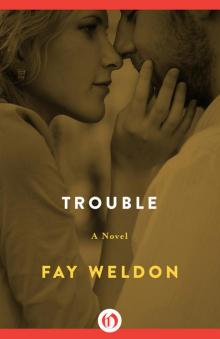 Trouble
Trouble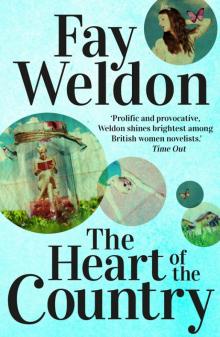 The Heart of the Country
The Heart of the Country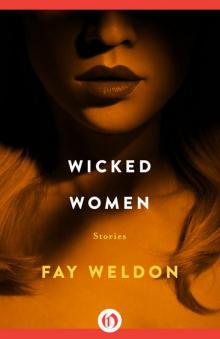 Wicked Women
Wicked Women Mischief
Mischief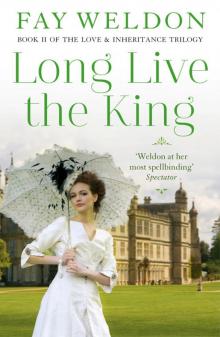 Long Live the King
Long Live the King Remember Me
Remember Me Worst Fears
Worst Fears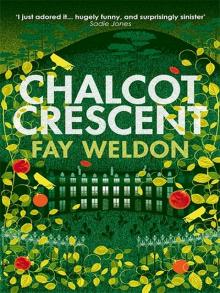 Chalcot Crescent
Chalcot Crescent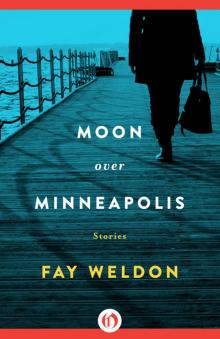 Moon Over Minneapolis
Moon Over Minneapolis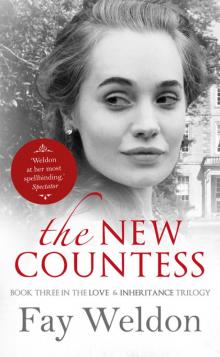 The New Countess
The New Countess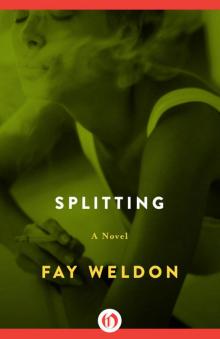 Splitting
Splitting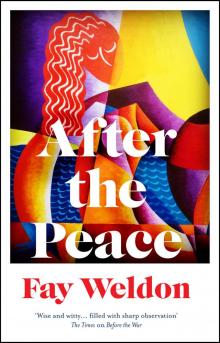 After the Peace
After the Peace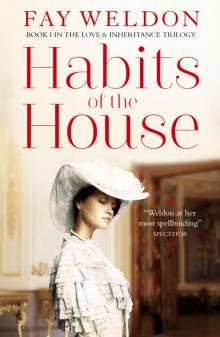 Habits of the House
Habits of the House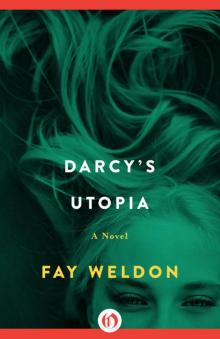 Darcy's Utopia
Darcy's Utopia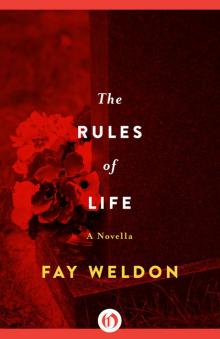 The Rules of Life
The Rules of Life Kehua!
Kehua! Before the War
Before the War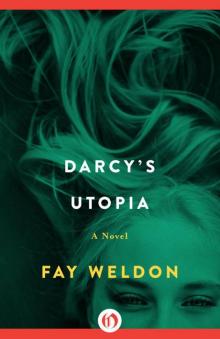 Darcy's Utopia: A Novel
Darcy's Utopia: A Novel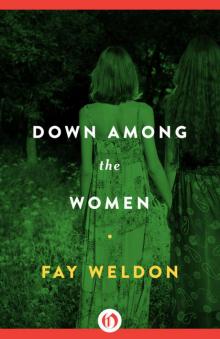 Down Among the Women
Down Among the Women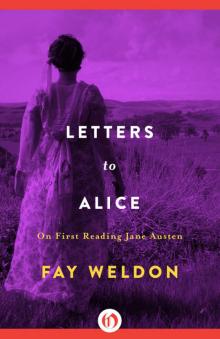 Letters to Alice
Letters to Alice 3 Great Historical Novels
3 Great Historical Novels Female Friends
Female Friends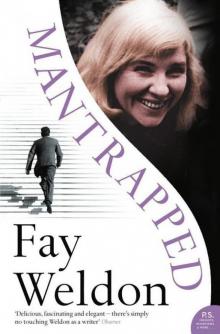 Mantrapped
Mantrapped The Bulgari Connection
The Bulgari Connection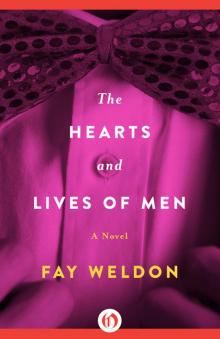 The Hearts and Lives of Men
The Hearts and Lives of Men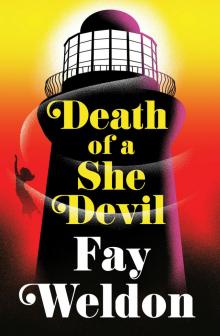 Death of a She Devil
Death of a She Devil